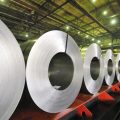Multinational Thyssenkrupp Steel will join ResponsibleSteel, a non-profit organization that ensures, through a certification program and global standards, that steel is sourced and manufactured responsibly at every stage. For thyssenkrupp, commitment to the responsible steel standard is another important element of the sustainable transformation process.
ResponsibleSteel pursues a global sustainability approach. For this reason, companies from all areas of the steel value chain, civil society groups, associations and other organizations are working under the ResponsibleSteel umbrella to improve steel’s contribution to a sustainable society. This includes, among other things, the responsible procurement of raw materials, production, use and recycling of steel. In addition to being committed to a sustainable supply chain, ResponsibleSteel has developed a broad spectrum of social and ecological criteria that broaden the concept of sustainability to include issues such as health and safety, greenhouse gas emissions, water and biodiversity management, human and labor rights, and community relations.
Thyssenkrupp’s Arnd Köfler says, “We are very pleased to become a member of ResponsibleSteel. We want to give our customers the certainty that we are shaping our transformation to climate-neutral steel production along the entire value chain, while also taking social and ecological criteria into account,” he explains.
Ali Lucas, acting CEO of ResponsibleSteel, adds, “We are a dynamic and growing organization and active participation is what makes our power and influence unique in the marketplace. We are implementing the ResponsibleSteel standard around the world and are proud that our positive impact is already making a difference. Membership of thyssenkrupp Steel will be a key part of this. We look forward to working together as we advance the contribution of steel and its manufacturers to a sustainable society.”
In this context, the decarbonization of the steel industry, which accounts for around 7% of global CO2 emissions, is of particular importance. Thyssenkrupp has therefore set itself the goal of reducing CO 2 emissions by 30 % by 2030 and making steel production climate neutral by 2045.








